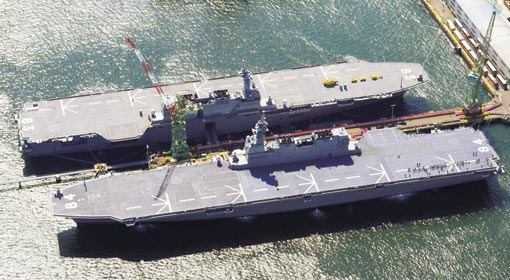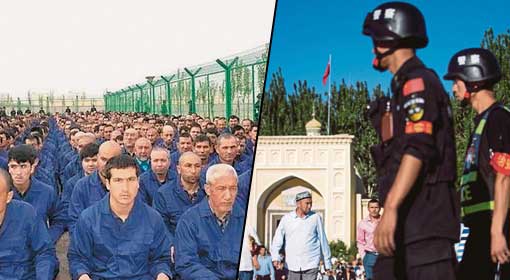 Beijing – A few days ago, Xi Jinping took the reins as the President of China for the third time at the ruling Communist Party’s convention. Western analysts are claiming that the decisions taken by Xi Jinping while taking over these positions have marked the end of the reform era of China’s former supreme leader Deng Xiaoping. Analysts pointed out that Xi Jinping has abolished many provisions such as the separation of party and government, collective leadership, promotion of private enterprise, central bank powers, independent position of prime minister. Therefore, it has been warned that distrust and conflict between China and Western countries will intensify.
Beijing – A few days ago, Xi Jinping took the reins as the President of China for the third time at the ruling Communist Party’s convention. Western analysts are claiming that the decisions taken by Xi Jinping while taking over these positions have marked the end of the reform era of China’s former supreme leader Deng Xiaoping. Analysts pointed out that Xi Jinping has abolished many provisions such as the separation of party and government, collective leadership, promotion of private enterprise, central bank powers, independent position of prime minister. Therefore, it has been warned that distrust and conflict between China and Western countries will intensify.
From 1978 to 1989, Deng Xiaoping, who worked as the ‘Paramount Leader’ of China, started the ‘Reform and Opening Up’ period in China. During this period, he managed to transform China from a socialist economy into the fastest-growing modern economy in the world. Besides, Xiaoping is also credited with establishing diplomatic relations with the United States. He initiated many things like ‘Special Economic Zone’, encouragement of foreign investment, encouragement of private enterprise, and giving additional powers to the central bank. His policy of Chinese-influenced socialism later became known as the ‘Deng Xiaoping Theory’.
 It is said that China succeeded in becoming the second-largest economy in the world due to Deng’s policies, various plans and decisions. Xi Jinping, who took over the reins of China for the first time in 2013, also mentioned and praised Deng’s policies in the early days. But due to the decisions made by his predecessors, Xi Jinping felt that the party had deviated from the original policy and factionalism and corruption had increased in the party. At the same time, the ambition to strengthen his grip on the party and the country drew Xi Jinping to Mao’s policies and began to reverse Deng’s reformist decisions, claims the American daily ‘Wall Street Journal’. Separation of party and country was a key issue in China’s reform era. However, Xi Jinping has repeatedly said that such a division is unnecessary. Now they seem to have made this a reality, Richard McGregor, a researcher at the Lowy Institute, pointed out. In the session that ended on Monday, it has been seen that Xi Jinping emphasized that the party’s leadership will remain the main focus in all areas while handling the country’s administration, Western media said. Deng had provided that the country’s Prime Minister would manage the economy. However, analysts have pointed out that Xi Jinping has made the prime minister an ‘office manager’.
It is said that China succeeded in becoming the second-largest economy in the world due to Deng’s policies, various plans and decisions. Xi Jinping, who took over the reins of China for the first time in 2013, also mentioned and praised Deng’s policies in the early days. But due to the decisions made by his predecessors, Xi Jinping felt that the party had deviated from the original policy and factionalism and corruption had increased in the party. At the same time, the ambition to strengthen his grip on the party and the country drew Xi Jinping to Mao’s policies and began to reverse Deng’s reformist decisions, claims the American daily ‘Wall Street Journal’. Separation of party and country was a key issue in China’s reform era. However, Xi Jinping has repeatedly said that such a division is unnecessary. Now they seem to have made this a reality, Richard McGregor, a researcher at the Lowy Institute, pointed out. In the session that ended on Monday, it has been seen that Xi Jinping emphasized that the party’s leadership will remain the main focus in all areas while handling the country’s administration, Western media said. Deng had provided that the country’s Prime Minister would manage the economy. However, analysts have pointed out that Xi Jinping has made the prime minister an ‘office manager’.
 ‘Xi Jinping is trying to re-establish the model of Mao, the founder of the Communist Party. It means that the party will manage the country’s economy and that ideological commitment is more important than business skills,’ said former US official Susan Shirk, criticizing Xi Jinping’s decisions. Experts have claimed that the leaders Xi Jinping selected in the party and in the administration were chosen only based on loyalty to him.
‘Xi Jinping is trying to re-establish the model of Mao, the founder of the Communist Party. It means that the party will manage the country’s economy and that ideological commitment is more important than business skills,’ said former US official Susan Shirk, criticizing Xi Jinping’s decisions. Experts have claimed that the leaders Xi Jinping selected in the party and in the administration were chosen only based on loyalty to him.
These decisions by Xi Jinping have made him more powerful than Mao, the founder of the Communist Party. Xi Jinping will continue to have complete control over the elected leadership of the Communist Party. Analysts also note that while doing this, they will not be pressured or pressured by any former leaders. In 2012, Xi Jinping first took the reins as the leader of the Communist Party. After that, he gradually tightened his grip on the party and the country. He alienated his opponents in the party by creating the appearance of an anti-corruption campaign. It includes about 200 senior leaders and military officers.
After the Communist Party Congress held in 2017, Xi Jinping assumed military control by assuming the post of chairman of the Central Military Commission. At the same time, he also hinted that he would lead for life by removing the limit of holding the office of President for only two terms. By incorporating his ideas into the party’s ideology, Xi Jinping portrayed himself as a leader as great as Mao, the party’s founder.















